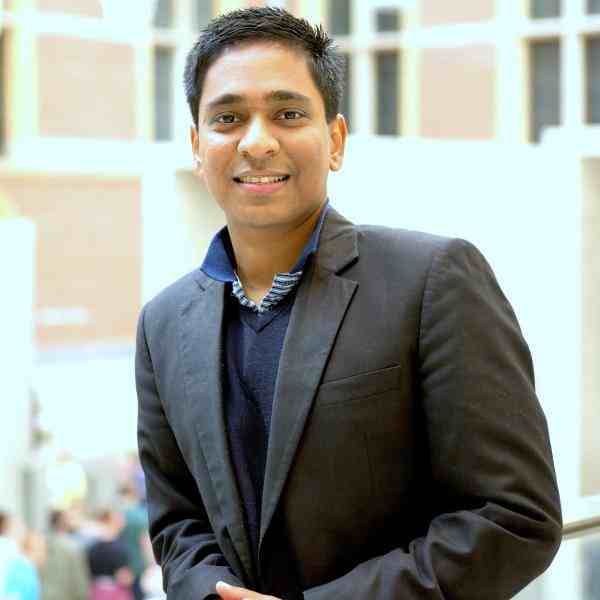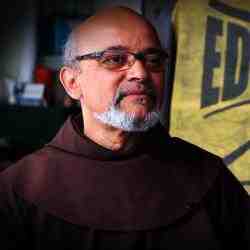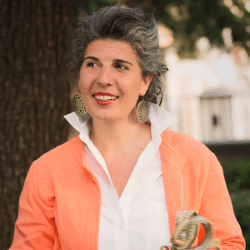前書き
To combat the lack of social mobility in Bangladesh, Ejaj has identified segregated schools as a root cause of this stratification. Ejaj is developing a new generation of youth leaders from diverse sections of society, who are working towards social cohesion and change in their country.
新しいアイデア
Ejaj Ahmad is convinced that the way to build an inclusive society is to realize the power of the youth, who have so far been isolated in segregated groups. To release this youth power, Ejaj is blending in one big movement by integrating the three segregated education streams in Bangladesh, namely English medium schools, Bengali medium (national curriculum) schools, and Madrassas (Islamic studies curriculum). With the tagline of “Building Bridges through Leadership Training,” he is doing this through inclusive training platform where students from various mediums are able to learn and work together in new ways. To create a lasting movement, he created an alumni network, which is breeding new categories of youth leaders, becoming trainers of trainers to spread this idea with a snowball effect. The youth leaders become roles models in their respective communities, further spreading the idea to the younger generations of youth, teachers, community leaders and parents.
To challenge the segregated education system, he has crafted a cohesive learning platform, focusing on leadership, problem solving, and team building skills, further enriching their learning through community based activities. With deep socioeconomic and political divisions, further impaired by an unsynchronized education system, he has engaged the Government to review the National Youth Policy, reflecting his vision of a unified youth development strategy. Ejaj believes that for the society to progress, Bangladesh’s development cannot be achieved by a divided society, and there needs to be an inclusive approach to engaging youth from diverse backgrounds in society.
Ejaj is cultivating this youth movement through strong civic engagements. He is engaging teachers, schools, and institutions to spread this idea to a larger pool of youth. To ensure a long term impact, he has developed a mechanism where graduates of his programs become roles models in the society. With a strong engagement process, these graduates implement new solutions to solving critical social problems. They are further retained, and trained to become trainers of the next generations of youth, and towards contributing to the development of Bangladesh. To scale his idea exponentially, Ejaj is drawing inspiration from his current model of training youth, to training teachers and schools in the future.
問題
In Bangladesh, youth comprise over one-third of the country’s population of 160 million people. With the segregation of the three education streams, the youth do not have an equal development opportunity. In particular, Madrasa students, often representing marginalized groups, are excluded from mainstream youth engagements. Employment opportunities for the youth are largely dependent on the education streams they enter. Most private sector companies attract students from mainstream education institutions which are typically inaccessible to Madrasa students. Madrasas often lack resources and forward thinking, further excluding their students from learning critical life skills, attuned with a progressive economy. Furthermore, most Madrasas do not fall under the Government funding mechanism, which leaves them being funded by various private institutions, and detaching them from central education development agenda and policies.
While the Government has been providing free mass public education, it has failed to create inclusive development strategies for all three mediums. Public schools in Bangladesh mostly comprise of Bengali medium schools, serving students from lower to middle income groups in Tier-1, Tier-2 cities and marginal rural communities. Most private schools in cities represent English medium schools, following the GCE UK based curriculum, and are typically targeted towards middle to upper income groups, whereas Madrasas are mostly represented by lower to middle socioeconomic groups. With no platforms to interact with students from other educational backgrounds, the youth population in Bangladesh is being segregated from a very early age, naturally developing strong stereotypes leading to various conflicts. Upon completion of high school, students are further divided into tertiary institutions which are selective based on their educational backgrounds. Consequently, young people end up pursuing advanced academic and economic opportunities based on the system they have followed during the early years.
In recent years, various youth backed conflicts took place between different interest groups, ranging from religious to cultural to political ideologies. As a result of these conflicts, questions have been raised about the values entrenched within different education streams. This led way to many informal dialogues and up rise of various youth engagement initiatives. It is widely felt that while the younger generation demands a united society, however, despite many efforts, they have failed to create platforms that are apolitical and free of nepotism. With a massive population, and a rigid education system in place, it will prove to be difficult to move towards a single education medium, or reform the education system overnight. Being a secular and diverse society, the challenge Bangladesh faces is to remove these barriers caused by segregation in society, and to ensure inclusive growth opportunities for the younger generation.
戦略
With a mission to create a youth movement through leadership training, Ejaj started a pilot program in 2008 in Chittagong. Through the pilot program, he realized that bringing youth from different mediums of schools in one platform enhances their learning scopes, performance, and their civic engagements. Supported by evidence based literature, effectiveness of merging diverse group to create diversity among youth, he launched his second program in 2009 in Dhaka, under the organization “Bangladesh Leadership Training Center (BYLC)”. Having students from extreme socioeconomic ends, with diverse values and strong stereotypes, he has placed various mechanisms to break personal barriers among the students. To overcome the challenge of creating a common identity, he made it mandatory for the students to wear a BYLC t-shirt. To enrich their learning process and ensure ownership, he also encouraged the participants to pay a nominal registration fee for the program. Today, BYLC offers different programs based on the age groups of the participants; Building Bridges through Leadership Training (BBLT) for age group of 17-22, and BBLT Junior for age group of 13-16. Within the programs, both theoretical and practical learning is emphasized on. Participants learn cutting edge theories of leadership, and are provided with opportunities to develop critical thinking skills through community engagements. They work in diverse teams, develop empathy through storytelling, and solve common problems together.
With strong stereotypes among different groups, Ejaj addressed the challenge to breakdown walls by promoting his idea through influential personalities; with key allies and supporters in the media and education. Having generated significant interest among the youth, BYLC continues to receive a large number of applications for its programs, with the acceptance rate ranging between 10 and 15 percent. BYLC graduates are celebrated for achieving excellence in different areas during the bi-annual Summit which draws leaders from private, public, and nonprofit sectors. However, Ejaj realized that most of the graduates following graduation from BYLC become detached from the network and from any substantial commitments towards social development. In 2012, he mobilized resources and engaged BYLC alumni to launch the BYLC Graduate Network (BGN), an alumni network of all graduates. One of the primary objectives of this supportive network is to effectively funnel their skills into practice, focusing on their contributions to give back to the society. Recently, a batch of graduates has been put through a rigorous training process to become trainers to facilitate BYLC programs. The network also encourages these young leaders to become role models, challenging various stereotypes among parents and community leaders of the segregated clusters.
BYLC’s impact has been largely in providing a common learning platform for marginalized youth, mostly Madrasa students. The first two presidents of BYLC Graduate Network came from Madrassa background. Several of the current facilitators and instructors at BYLC also came from Madrassa backgrounds, which is a strong indicator of the impact of BYLC’s programs on young people.
After running BYLC for several years, Ejaj recognized the need for creating a more structured development platform for BYLC alumni, especially assisting them in their career development. Having faced high staff turnover, in 2014, Ejaj launched his second network, the BYLC Staff Alumni Network. The objective of the network is to ensure that BYLC continues to benefit from their knowledge and engagements with its various activities. In order to provide a comprehensive tool for all current and former members of BYLC, Ejaj is developing an online and mobile application that provides a virtual directory of other members in the network. The primary objective of this tool is to help members connect with each other as they travel. Using the same platform, BYLC plans to provide updates of activities, and learning materials. In addition to that he has launched the platform of “Office of Professional Development – (OPD)” to ensure that graduates and alumni of BYLC are able to access professional engagement opportunities. Through this initiative, Ejaj is also influencing corporate recruitment processes.
BYLC is registered as a non-profit, largely depending on grants and donor funds. Having increased the number of programs and outreach, Ejaj has often faced financial hurdles, which forced him to rethink his business model. Currently, BYLC is putting together a private sector endowment fund which will ensure long term sustainability of the organization. Parallel to this, Ejaj is also working to identify and expand the revenue streams of the organization to off-set some of his programmatic costs. Backed by strong impact evaluation study by BRAC, Ejaj is also building key partnerships to place strong evaluation and impact studies of his model, which in turn will also help garner wider interest in BYLC.
By 2020, Ejaj plans to take BYLC to five major divisions in Bangladesh, having satellite centers running BYLC programs. Having trained 2500+ students, he is now exploring multiple ways to increase BYLC’s reach. Recently, he collaborated with the Ministry of Education to bring together a cohort of teachers from the different mediums of schools. He is building a similar leadership platform to train teachers across the country. To complement the core programs, Ejaj is building an online platform that would increase his outreach to those that usually do not have the ability to attend the physical programs.
人
In 1991, when Bangladesh was hit by one of its worst floods in recent history, Ejaj Ahmad teamed up with three friends to raise money for the victims of the disaster, by going door-to-door around their neighborhood. He was only 10 years old. Ejaj and his friends ended up collecting Taka 7,000 (nearly $200 at the time) and later joined a team of the Rotary Club to distribute relief goods in the flood-hit areas, travelling on a boat.
Born and raised in Dhaka—the capital of Bangladesh—this was the sort of values and environment Ejaj grew up in as a child, in a family that greatly valued public service and education. His father, a professor of management at Dhaka University’s Institute of Business Administration and an active Rotarian, encouraged him to take up community initiatives from a young age. Throughout his teens, he got heavily involved in supporting his father’s Rotary Club to organize adult literacy and free medical camps at their ancestral home in the village.
This early exposure to community work created awareness in Ejaj of the value of leadership in effecting change in the lives of people. At 15, reading the book Effective Leadership by the British management author John Adair, Ejaj learned of the requisite skills necessary to become a leader, which he could use in his public service endeavors. He would go on to test these skills during his undergraduate studies in Economics at St. Andrews University in Scotland, by becoming actively involved in student politics. As an elected member of the students’ association, in 2003, Ejaj contested against six other candidates to try and become the first non-white President of the students’ association. Despite being in a foreign environment, Ejaj drew on the strength of his exposure to organizational activities from a young age, to build strong and lasting relationships with students from all diverse backgrounds at the institution. Despite finishing third, the campaign made him conscious of the real function of politics and leadership in a society, beyond a competitive election, which would lead him into a journey in redefining leadership.
Following graduation, Ejaj pursued a career as a research economist in Bangladesh, working in projects related to banking, international trade, and sustainable environment management. While working in different donor-funded projects, he realized it was not the dearth of resources or initiatives that held back Bangladesh’s development, but an absence of effective leadership that could bring these disparate efforts together. He realized the quality of leadership in Bangladesh had to change.
In 2006, Ejaj enrolled in the Master’s in Public Policy program at Harvard. During the first year of the program, Ejaj found himself among lifelong practitioners of the subject who opened his eyes to the numerous forms in which leadership can be perceived and exercised. In 2007, while distributing free books among students of 25 schools at his ancestral village, during his summer break, it dawned upon Ejaj that an effective way forward for Bangladesh’s development would be to instill in its young people values and skills of inclusive, compassionate, and competent leadership.
On his return to Harvard, Ejaj worked to develop the plan of a youth leadership center. During his final days, Ejaj and Shammi Quddus, then a second year undergraduate student at Massachusetts Institute of Technology, won the 2008 Davis Projects for Peace Prize for $10,000 to run a youth leadership program in Bangladesh. They moved to Chittagong, Shammi’s hometown, where they implemented the pilot Building Bridges through Leadership Training program, a month-long after-school course for 30 high school and college students from English, Bangla, and Madrassa medium backgrounds, which eventually became the starting point for Bangladesh Youth Leadership Center (BYLC). While Shammi moved on to complete her studies at MIT, Ejaj moved the initiative into forming BYLC. Starting in 2009, and within a span of seven years, Ejaj has transformed BYLC from a living room project to one of most trusted, respected, and sought after youth leadership platforms in Bangladesh.




